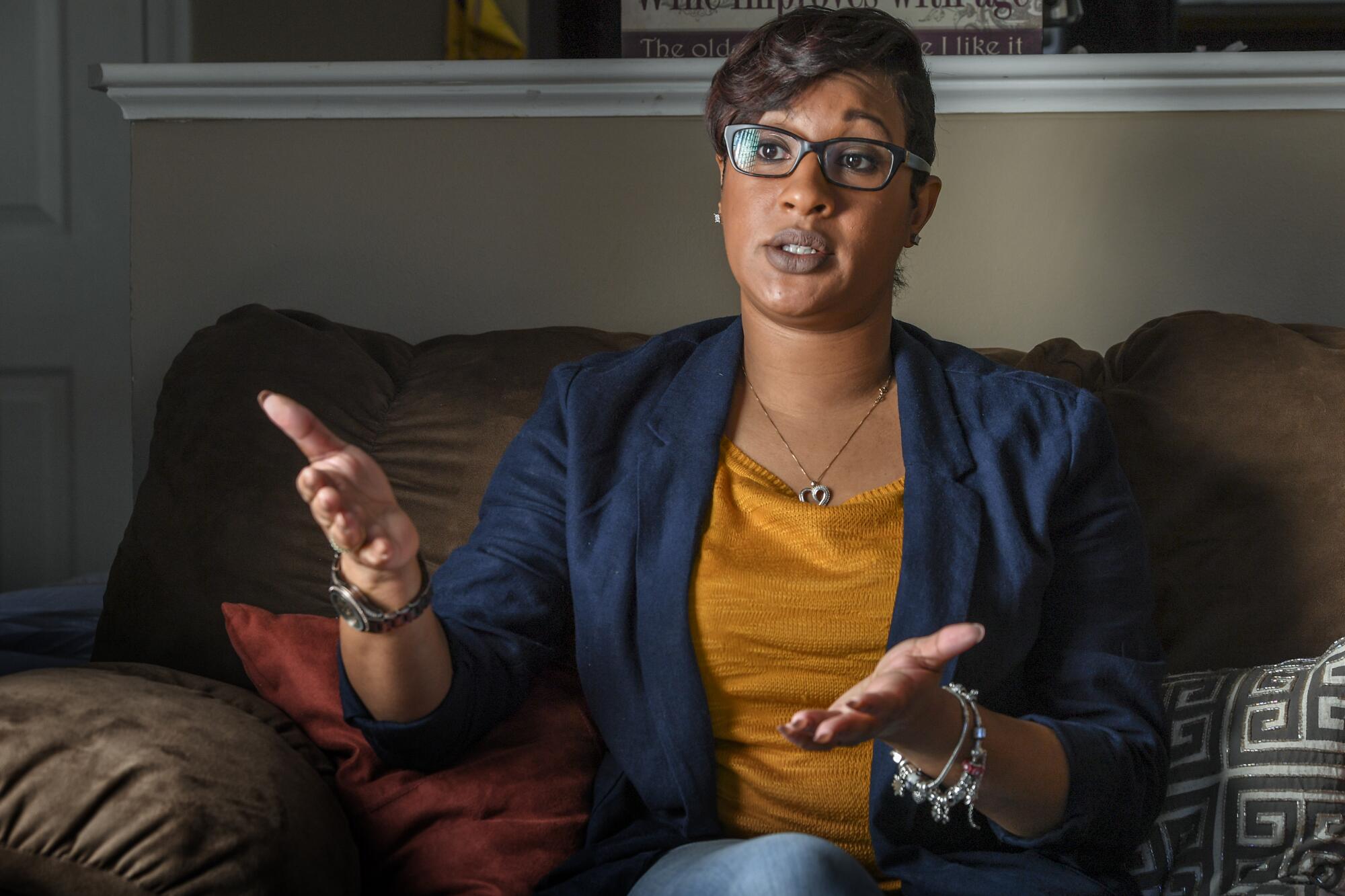
- Share via
SAN DIEGO — For more than a decade, Tameka Jones held onto the idea — a fantasy, really — that her son would come home one day.
She believed it in April 2002 after she got a call from her then-husband, the man she’d trusted to care for 2-year-old Jahi Turner while she was deployed on a Navy ship off San Diego. “Baby, I can’t find Jahi. The police are here,” she recalled hearing as she stood on the smoke deck of the USS Rushmore, her hand trembling as she held the phone.
Jones, then just 18, was certain she’d see Jahi again even as police told her they didn’t believe her husband’s version of how the boy disappeared. She kept believing it as weeks, months and years went by without charges filed or a body found.
Now divorced and living in Maryland, Jones has tried to deal with the shock, anger and denial that have washed over her in waves over the past 18 years.
She says she knows it’s unlikely that Jahi is still alive, especially after viewing evidence from the investigation — evidence considered in 2018 by a San Diego jury.
But still she has questions and hopes that one day, maybe, she’ll get answers.
“It wasn’t until a couple of months ago that I felt like I was not going to just implode, fall apart,” said Jones, during an interview at her home in Baltimore, a year after a jury failed to reach verdicts in the high-profile case. “And even now, it’s a teetering edge. Every day is more of a struggle.
“Every day is further away from a solution to my son,” she said of Jahi, who would have turned 20 this year. “But throughout all of this, I had hope that he was coming home.
“A hope that I would know what happened to him.”
‘No longer a teenager’
Tameka Jones — she was Turner back then — was 16 when she became a mother. She’s now 37.
Jahi, she would say years later, was “such a sunshine,” a naturally happy baby who seemed to nurture his mother, just like she did him.
“He was so easy,” Jones said. “And I think God gave me him because He knew that I was like, ‘I’m in school. I am not ready to be a mom ... but I have this little guy and he’s such a joy.’”
Jones had met Jahi’s father, Tramane Sampson, while living in Frederick, Md., about an hour’s drive from Washington, D.C., where she was born. She said they didn’t really have what she would call a “relationship,” and at 16, she started hanging out with another man — about six years older than she was — whom she had known in passing, a local drug dealer named Tieray Jones.
“He was different,” she recalled. “He was really smart. It seemed like he should not have been out on the street, but I guess at the time and, from what he explained to me, it was his only choice.”
According to Tameka Jones, Tieray had been kicked out of school and had family issues that led him to Frederick. Although she might not have articulated it at the time, she wanted to take care of him, too.
“You get that mother instinct,” she said, looking back on the relationship. “Like, I know you can do better. Let’s try to make this better.
“At 16 or 17 years old, you have no idea, but you think you know.”
Penny Thompson knew the challenges her daughter was up against. Thompson was 18 when she became pregnant with Tameka. Thompson recalled that she was shocked and upset when she learned her daughter was pregnant.
“That mistake don’t have to define her,” Thompson said, adding that, despite the challenges in her own life, she made it her goal to get her daughter through high school.
For years, Thompson struggled with drug addiction. She started using crack cocaine when her daughter was about 4 years old, but she maintains she was always there for her two children. She described herself as “a functioning addict,” able to work and be physically present for her children.
Jones recalled her relationship with her mother a little differently.
“Just because you are there does not mean that you are there,” she said. “It was never out of her mind that she had kids, but the addiction was more important to her at the time.”
Thompson said she used drugs for two decades before getting clean and, looking back, conceded she was “emotionally dependent” on her daughter.
“She grew up too fast,” Thompson said. “Tameka understood once she had Jahi — when a teenager gets pregnant, they’re sort of no longer a teenager.”
‘A positive family unit’
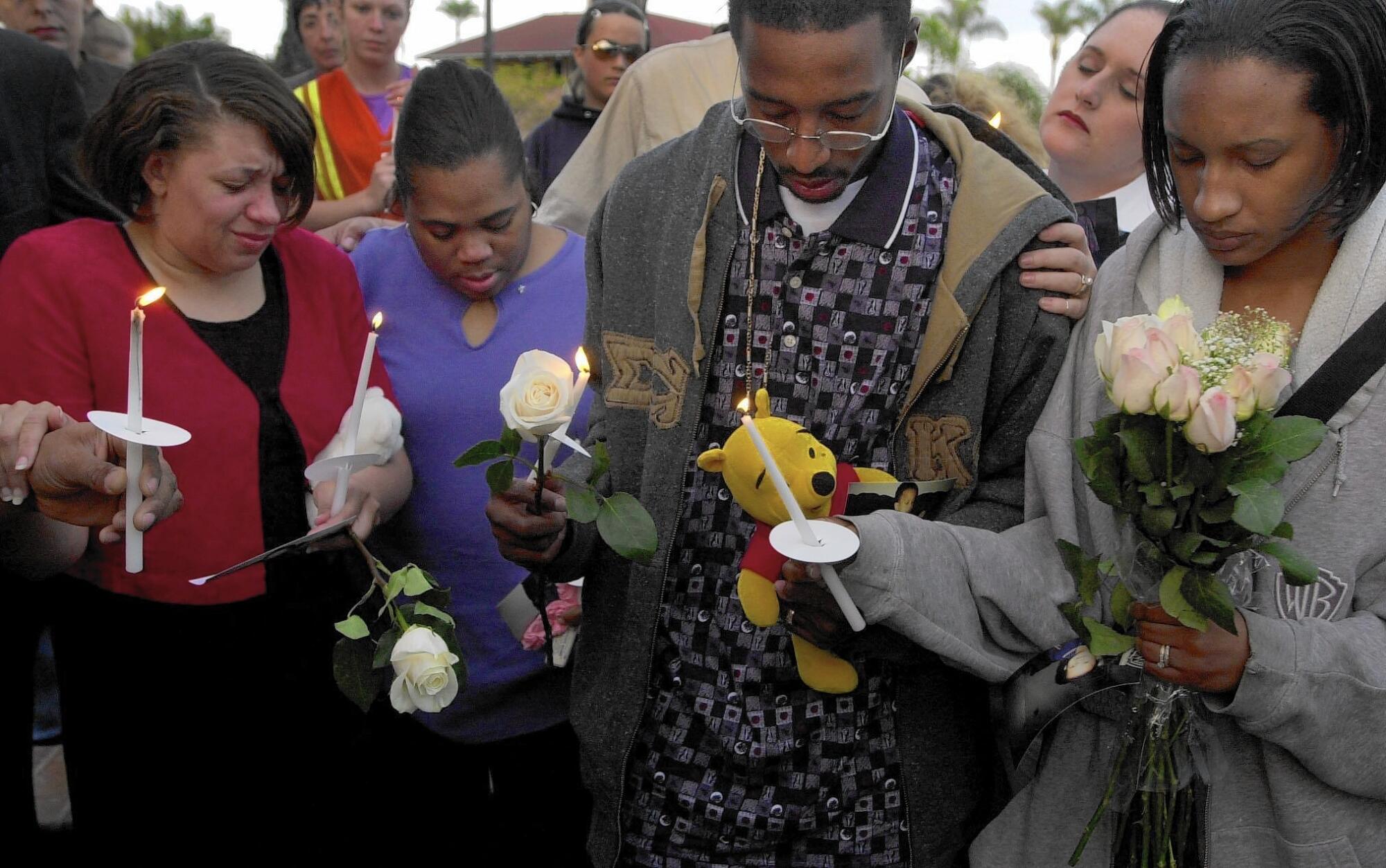
As a young mother, Jones looked forward to building a life with Tieray, but she admits now that there were red flags. She knew he was spending time with other women, but he made her happy.
“Back then, I was in love with him,” she said. “I can’t actually say that it was love now. It was more infatuation than love. You have this older man who has a lot of money and wants to spend the rest of his life with you and that’s just … to me it was great.
“And the fact that he willingly took in Jahi and made sure that he was good. … I thought [we] would be a positive family unit.”
Tameka Jones joined the Navy in August 2001 and married Tieray on Dec. 27, about four months before Jahi disappeared. Trained as an operations specialist, she headed to San Diego in early 2002 and was stationed on the Rushmore by February.
The plan, initially, was that Jahi would stay behind in Maryland with his grandmother, Penny Thompson.
“Jahi wasn’t supposed to come out until I got back from deployment,” Jones said. “I didn’t want Jahi to come out and just be with Tieray for six months.”
It seemed a prudent decision, but things changed abruptly when Jones got a call from Child Protective Services in Maryland, telling her she had 24 hours to remove Jahi from Thompson’s home because of the drug use.
“I freaked out,” Jones said. “I was angry. I’m like, you know you’re supposed to be taking care of my son. You are supposed to be getting your s— together.”
Looking back years later, Thompson bristled at the idea that her grandson had ever been exposed to any harm while in her care.
“Don’t think for a minute that he was in any danger,” Thompson said. “I didn’t have a bunch of people in my house getting high.”
She now recognizes why Tameka had to return to Maryland to get her child. And she acknowledges that Jahi’s trip west was part of a series of events that led to his disappearance.
She put it simply: “It put into play for Jahi to not be here.”
Jones returned to San Diego, with Jahi, on a Sunday in April 2002. She was scheduled to ship out the next morning for a week of exercises aboard the Rushmore. Before she left, Jones used the little cash she had to stock up items her husband and son would need while she was away.
On Thursday, April 25, 2002, she received a message from a shipmate: Her husband had called, and there was an emergency back home. Standing on the ship’s smoke deck, she called him back.
Her eyes filling with tears as she thought back to the moment, she said: “And that has been the beginning of the rest of my life.”
Jahi goes missing
“What do you mean you can’t find Jahi? Where is he at?”
Jones’ husband told her he had turned his back on Jahi just briefly, and the boy was gone. He said police were at their Beech Street apartment in the Golden Hill neighborhood of San Diego and that they had begun a search.
Jones remembers screaming: “Where is my baby? WHERE IS MY BABY?!”
Her shipmates alerted the captain to what was happening, and he stopped the ship. Cell reception was spotty, and she strained to hear a San Diego police detective talking to her over the phone. She was taken off the Rushmore at Coronado. Back at the apartment complex, she raced up the stairs to their second-floor unit, calling out her boy’s name.
Police had blocked off the apartment with crime tape.
“That night, I remember it was really cold,” she said, crying. “And I was like, you guys gotta find my son because it’s so cold outside and he doesn’t have a jacket on.”
She didn’t see her husband until she got to the police station, where he was being questioned.
Tieray Jones, then 23, told her and police that he had walked the toddler to a neighborhood park earlier that day. He told her Jahi asked for his sippy cup, so Jones walked to a vending machine to get the child something to drink. He remembered a woman in the park with children not too far away from them.
“He was like, ‘I just turned my back for a second.’”
Police doubted his story. For starters, the vending machine was more than a hundred yards away from the spot where Tieray Jones said he last saw his stepson.
“I wasn’t present for his initial conversations, but when I heard that he leaves a 2-year-old baby way over here and he walks way over there to a soda machine, [it] did not make sense,” said Maura Mekenas-Parga, a retired San Diego police detective who worked the case.
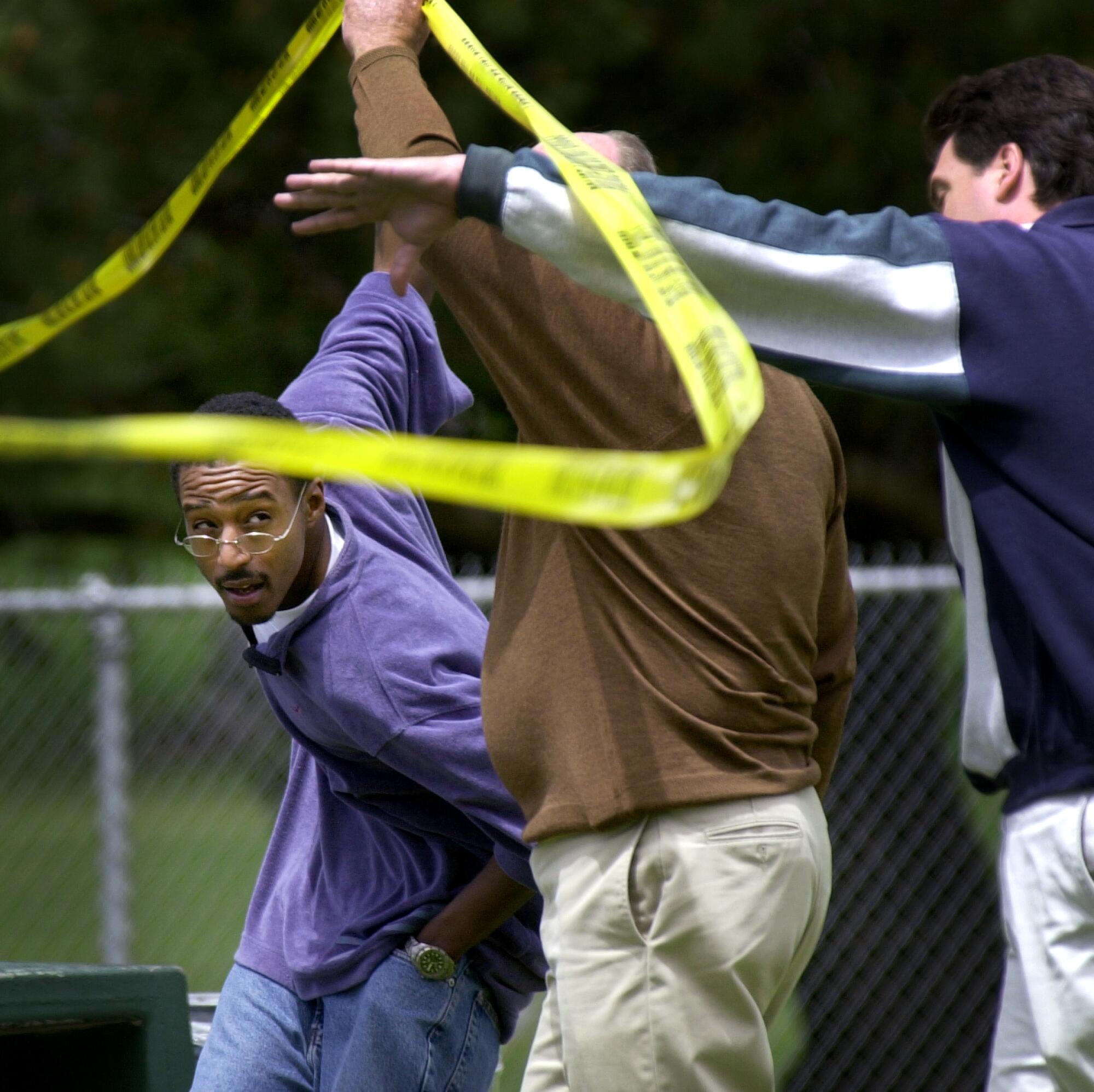
“I don’t think anybody takes their eyes off a 2-year-old, especially when there’s a busy street there,” she said.
Authorities launched a massive search — in the park, the surrounding neighborhood and nearby canyons — with personnel from every local law enforcement agency and a host of volunteers. They numbered in the thousands.
“I ran the mounted unit,” said the retired detective, known to many as “Mo” Parga. “My focus was more on the canyons because I’m a coyote freak. I’ve seen coyotes run off with dogs and stuff. That’s where my focus was.”
Having just worked another high-profile missing-child case — 7-year-old Danielle van Dam disappeared from her home in the Sabre Springs neighborhood in February 2002 — Parga took a lead role in the investigation into what happened to Jahi.
She was tasked with trying to connect with Tameka Jones, but that was not easy.
“She couldn’t carry on a conversation,” Parga recalled. “She was just crying, shaking. It was frustrating for us because by then we were like, Tieray did something. We had already had an interview with Tieray, so we needed her to say, ‘Hey, where’s my baby?’ We needed her to toughen up … and she couldn’t do it.
“It was frustrating to us. But you know what? We weren’t 18 [or 19] years old. We were adults. We had more information than Tameka did.”
Jones wasn’t interested in talking. Grief-stricken and angry, she wondered why the police were spending so much time with her and her husband. Why weren’t they out searching for her boy?
“She was yelling at us. She was mad at us,” Parga recalled. “She didn’t know there’s [thousands of] people looking for the child. She thought we were all there at the station just picking on her and Tieray. So she didn’t see the full picture. …
“I don’t blame her for being angry,” the detective said. “Not one bit.”
They were wasting time, Jones remembered thinking. Not just hers, but also Jahi’s. Why were police asking questions about her husband’s arrests back in Maryland? (Back then, he had a few convictions for marijuana possession and an arrest on suspicion of drug distribution.) What did any of that have to do with her missing child in San Diego?
She trusted her husband — more than she trusted anyone else at the time.
“There’s anger because you are telling me the first people you look at are the closest in the family,” she recalled. “I’m like, this man has pretty much been taking care of Jahi since we’ve been together.
“The only person that I have is him,” she said.
The case goes cold
Six days after the search began, the couple appeared at a news conference in San Diego, pleading for Jahi’s safe return. Meantime, officers were combing through tons of trash in a city landfill.
Jones made a couple more media appearances on the advice of police. But soon after that, with still no sign of Jahi, she shut down. She stopped talking to investigators and to some of her own family members.
“I didn’t have anybody,” Jones said. “I was in San Diego by myself and I hated everybody. I hated my mom for pretty much being a catalyst for this situation. I hated Tieray because [he] was supposed to be watching [Jahi]. I hated everybody that was judging me for not reacting in a certain way.
“It is so hard to live up to people’s expectations of what you’re supposed to do. And at 19, I had no idea what I was supposed to do but find my son.”
Police remained focused on Tieray Jones but made no arrests.
In 2003, the case was submitted to the San Diego County district attorney’s office, which rejected it for lack of evidence. Sometime in 2004, the case was shelved.
By then, Jones and her husband had separated. They each returned to the East Coast and kept in contact because of a son they had together, born in San Diego in 2003. Occasionally, Tameka would bring up Jahi.
“He would never initiate it,” she said of Tieray. “It was always me.”
At first, Jones said, Tieray would talk to her about losing Jahi in the park, but over time he quit answering her questions. Eventually, she stopped bringing up the subject, finding it too painful to talk about her missing boy with friends, family or the police.
Still, she remained hopeful.
“My son is going to come home,” she said she thought to herself. “I’m just going to be ready for him when he comes home. No matter what it takes. I’m going to make sure that my life is good for him to come home, and he can be successful and we can work through.”
She went to work at the United States Naval Academy in Annapolis. She was on shore duty for the next three years.
“It was hard for me to even step back on the ship without having a panic attack,” she said.
Later, she left the military and found a job with a small electrical contractor, followed by temporary gigs and finally a job at the University of Maryland, where she works as an administration and finance manager.
She went back to school. And this time her mother, Penny Thompson, was there for her — actually there.
“Luckily, over the years my mom has done tremendous work turning her life around,” Jones said. “She knew that she would not be able to have a relationship with my [younger] son if she did not get herself together.”
Jones said she and her mother didn’t talk much over the years about the addiction and what it did to their relationship. It seemed to be a sore subject.
And now her perspective is different. “What I went through in my childhood has made me who I am today,” Jones said.
Thompson says she’s been off drugs more than 10 years.
“God called me,” Thompson said in an interview, noting that she had been off drugs for years when the case was reopened and she headed to San Diego to testify in court.
“He was preparing me for what I would have to face.”
A fresh look
At the end of 2012, Tameka Jones filed for divorce.
That was welcome news to Mo Parga, who viewed it as a sign that she might be able to build a working relationship with Tameka.
They spoke in August 2013, when Jones called up. She was crying, saying she’d heard that Jahi’s body had been found.
Parga had heard the rumor, too. It wasn’t true.
“She goes, ‘Tieray just called and he’s in a panic because Jahi was found in a duffel bag,’” the detective recalled. “I said, ‘Honey, no, and if that was true you would get the first phone call — not Tieray.’”
By then, Parga had started to recruit colleagues to take a fresh look at the case, including Lynn Rydalch — who was a San Diego police detective in 2002 and then became an investigator in the district attorney’s office. Parga also took the case to Deputy Dist. Atty. Bill Mitchell, who had recently and successfully prosecuted a murder case in which the victim’s body was never recovered.
Mitchell was interested.
“We started digging into it,” he said, “and I thought there was a prosecutable case there.”
In July 2015, the investigators flew Jones to San Diego to introduce her to Mitchell and the others working on the case, and to show her some of the evidence.
She hadn’t been ready to see it in 2002, the investigators thought. Maybe this time would be different.
Parga took Jones back to the apartment complex on Beech Street, where police had gone back recently to dig in the canyons behind it for clues. They took her to the police station where Mitchell told her unequivocally that investigators believed Jahi was dead and that her ex-husband was responsible.
“She cried,” Parga said. “She was so angry. At Tieray, I think, and at us.”
This was a turning point for Jones. She had been holding on to the belief that Jahi was alive somewhere. And now that belief was shattered.
Parga remembered walking Jones outside the police station to get a cigarette.
“Mo, I can’t believe this is happening,” Jones told her. “All these years, I’ve hung onto this — that notion that somebody’s taking care of him. And you’re killing that. You’re stopping that.”
Parga pushed back.
“All right, you want me to stop investigating this?” Parga replied, a bit angry. “You want me to just let this go?”
Jones said she didn’t.
“Hey, I’m busting my ass here,’” the detective continued. “‘You want me to stop? I’ll stop. This is it. We’re going for it now.”
Things were better between the two women after that.
“She got to yell at me,” the detective said. “I got to yell at her.”
Not coming home
Prosecutors said having Tameka Jones’ cooperation this time around provided a boost to the case. She could look at the evidence, help connect the dots.
For the first time in 13 years, Jones read a journal she and Tieray had kept in those early months of their marriage. There were entries she had never seen, written after she had deployed on the Rushmore.
Some talked about Jahi wetting the bed and getting a bump on his head. One entry, dated April 23, 2002, read:
Today for some reason he hasn’t been moving or really talking. Jahi is starting to act really funny he won’t get up off the floor. He’s not walking or talking when I tell him to get his cup he just looks at me.
I know it’s going to take some time. But I don’t want him hating me for something I can’t control. The bump on his head has gone down I put ice on it. It’s gotten a little red
Other entries described Tieray Jones’ unsuccessful attempts to use the bank card his wife had left behind. In other entries, he described his love and admiration for his wife.
Looking back on those journal entries, Jones said she realized they didn’t sound authentic. They seemed “staged.”
“This is not how he would have talked,” she said. “It was a lot of information and I went back [to Maryland] feeling like I was the worst person in the world. I was the worst person in the world because … I didn’t come to that conclusion all those years ago.”
Working with prosecutors, Jones identified items found in a dumpster near the Golden Hill apartment, confirming they had belonged to Jahi. And she told them Tieray had no money when she left for the Rushmore. She used all they had to stock the apartment with food.
With that information, prosecutor said, investigators could gauge what was — and what probably should have been — consumed in the days before Jahi was reported missing. The timeline seemed off.
“[Jahi] had come out here from Maryland with his bag of animal cookies, and they were uneaten,” said Nicole Rooney, a child abuse prosecutor, who worked the case with Bill Mitchell. “And he loved those. So there was not enough food gone from the house. There was no evidence that he’d been living there that entire time.
“These were things that Tameka didn’t open up about until then.”
At the behest of police, she agreed to cold call Tieray Jones in 2015, asking him questions about Jahi with investigators listening in.
In that call, Tieray Jones can be heard saying he often thought about the day Jahi disappeared and acknowledged that people blamed him. “I should have been paying attention,” he said.
He mentioned something about an accident but never said the boy was injured on his watch. “If it was an accident, sweetheart, I would have just said it was an accident,” he said.
Tieray Jones, then 37, was arrested in North Carolina in April 2016.
He was charged with murder.
No definitive answer
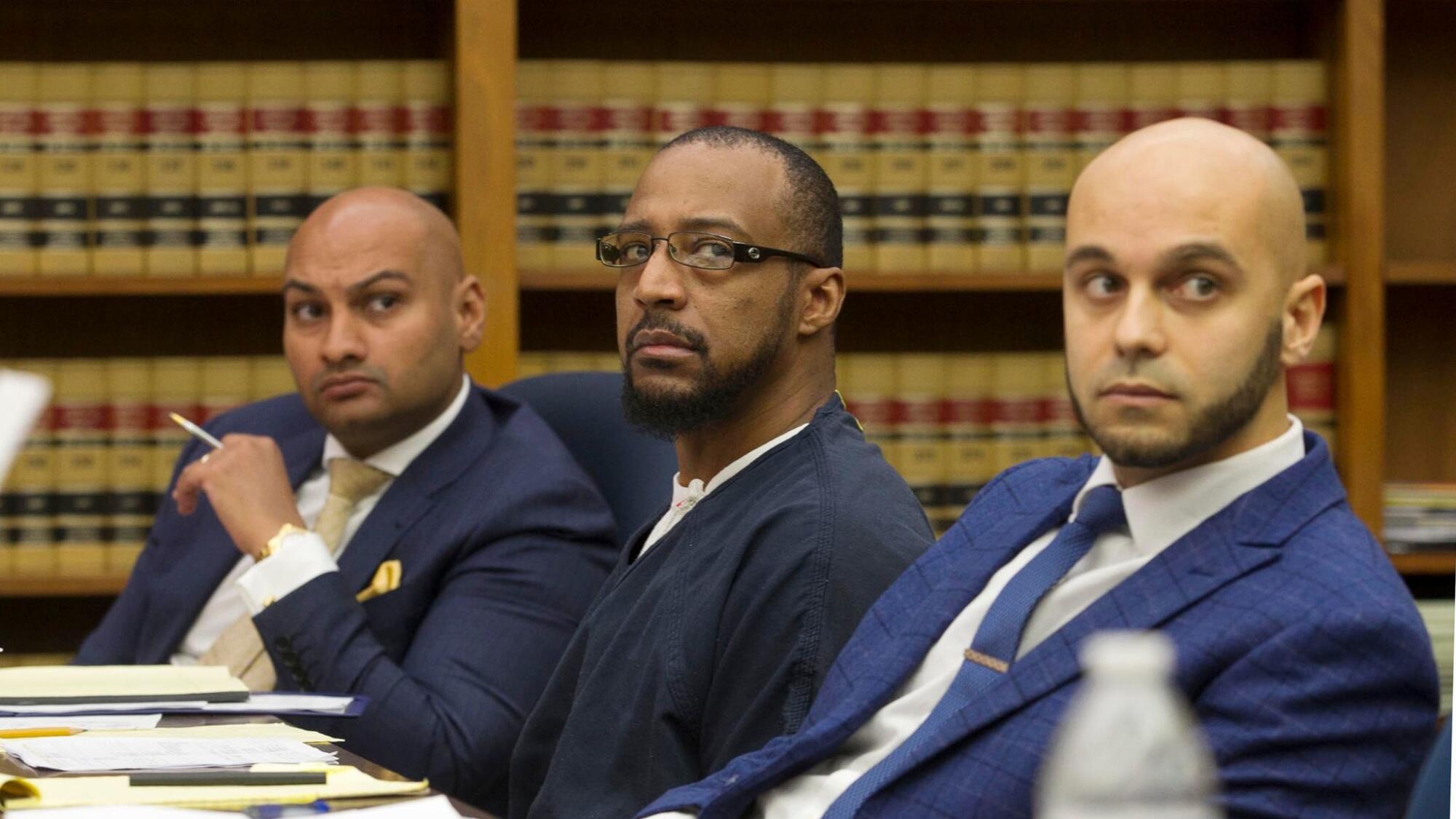
Mo Parga remembers when Tieray Jones was taken into custody. She was there when it happened. She’d waited 14 years for that moment.
“He looked at me and he goes, ‘San Diego?’ and I go, ‘Yep,’” she recalled. “And he fainted.”
The trial began in February 2018. Mitchell and Rooney argued that Jahi was injured on Tuesday, April 23, 2002, his body then discarded in the trash, which ended up in a landfill.
They said Tieray Jones never went to the park with Jahi on Thursday, the day he called 911.
Deputy Public Defender Courtney Cutter stressed to the jury that police put the case on hold in 2004 because they were unable to prove Tieray Jones did anything to harm his stepson. She called witnesses who testified about Jones’ affection for the boy and for his children from other relationships.
“He may have been an imperfect father,” Cutter argued, “but not a reluctant one.”
Tieray Jones testified there was “no way” he could ever strike Jahi, whom he referred to as “my son.” He said he wanted to be someone Jahi could look up to, someone who could provide a safe home.
And, he said, he had hoped to give Jahi his last name.
The April 23, 2002, journal entry said Tieray Jones called his wife to tell her Jahi had fallen and bumped his head. He testified that he saw the couple’s two cats run into a bedroom in the apartment. He heard a crashing noise and walked over to ask the toddler if he was OK. He said Jahi was standing by the bed and then crawled onto it.
Later, Jahi wasn’t talking or walking much.
“If I thought he was sick, no way I wouldn’t have tried to remedy whatever was wrong,” Tieray Jones testified.
In the end, 12 jurors deadlocked, unable to agree on whether he was guilty of second-degree murder.
The attorney in the case spoke to the jurors later. They learned that two members of the panel voted to convict on the murder charge, 10 for acquittal. Eight of the 12 believed Jones was guilty of the lesser charge of involuntary manslaughter, which would apply if Tieray Jones had hurt the boy accidentally and failed to get him medical care.
Two jurors believed firmly that he was not guilty.
A few days later, San Diego Superior Court Judge Joan Weber ruled there would be no retrial, noting that a few drops of Jahi’s blood on a blanket and the writings in the journal weren’t particularly strong evidence of murder. The judge said it was unlikely that new evidence or new witnesses could be found that would persuade a jury to convict.
“It saddens me to my core to say this,” Weber said in court that day. “I would want nothing more than a definitive answer to what happened to [Jahi] that week of 2002.”
The prosecutors were stunned by the judge’s decision. They were sure they would take the case to trial again. “We were still proud that we did it,” Rooney said.“We were happy that Tameka got to see it.”
Parga took it hard, too.
“It’s good that I’m retired because I pretty much hate what happened,” she said.
Tieray Jones could not be reached for comment on this story. Cutter, the defense attorney, described her former client’s reaction to the judge’s decision as “a combination of unabated sorrow and relief.”
For her part, Cutter said she believed the outcome was correct, “but it brought with it no closure for anyone, which is unbearably hard. As a parent, I can only imagine the pain and torment Tameka must feel.”
Time for healing
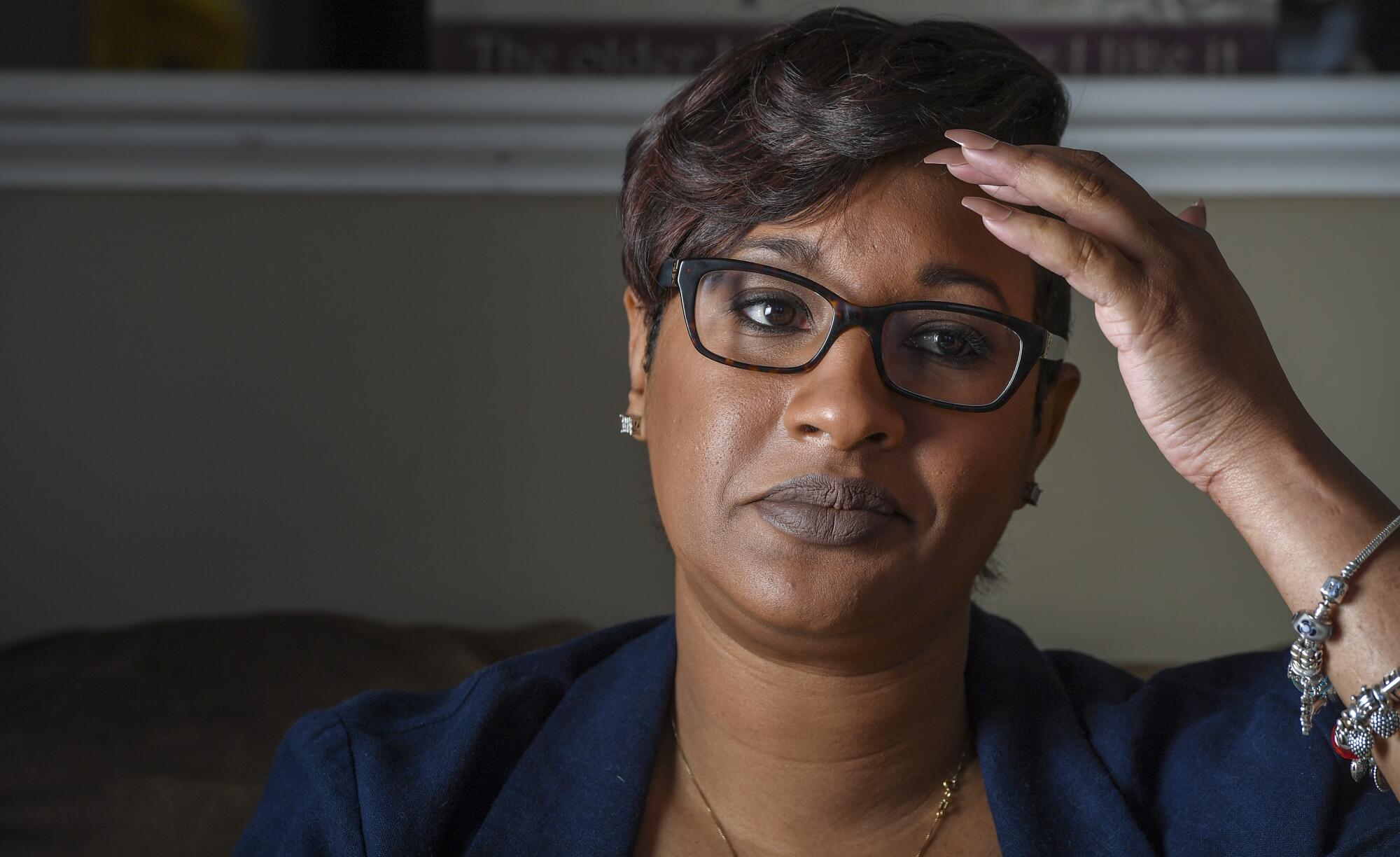
The way the trial ended rocked Tameka Jones to her core.
“I just lost it,” she remembered. “I’m [thinking] I didn’t do enough. I didn’t say enough on the stand. They didn’t get enough information. They didn’t get enough background.”
Again, she turned inward. She shut down.
Then, when enough time had passed, she decided to open up. To tell her story. At last.
“For a long time, I’ve been quiet, and I’ve been quiet to keep my sanity and try to deal with it in the best way that I possibly could … that was for me to just stay out of the limelight,” she said. “Only the closest people [were] privy to my thoughts.”
Looking back, she allowed that maybe prolonged silence might have been detrimental to her healing — and to her family’s ability to seek justice in the courts. Maybe if she had spoken up sooner, louder, more often, things might have been different.
“Maybe if I had been an advocate or had talked about everything for years,” Jahi’s disappearance “would have stayed fresh in people’s minds,” she posited aloud. “It would have been just a different mindset for people coming into the trial.
“I don’t know.”
Then again, maybe not.
For now, all there is to do is move forward, to keep working on herself and nurturing the positive relationships in her life. She recently launched a consulting business in human resources, and plans to start a foundation in Jahi’s name to provide resources to teen mothers — to let them know “that’s not the end of it.”
“You can still do what you set out to do even though you had a child at a young age,” she said.
Most of all, she tries to be a good mother to her now-17-year-old son. The one who never got to know Jahi.
“My sanity has been because of my [younger] son,” Jones said. “I knew I needed to keep it together because of him, and I am so thankful every day that I had him. Because I don’t think, and this is the honest to God truth, I don’t think I would be here if it wasn’t for him.”
Jones will never stop looking for answers about what happened to Jahi. And though she says she now accepts that he won’t be coming home, there are moments — a flicker in her eye, a word that slips from her lips — that suggest, well ... maybe.
“I don’t care if it takes another 18 years,” she said. “but I am always going to continue to fight for the truth of my son.”
More to Read
Sign up for Essential California
The most important California stories and recommendations in your inbox every morning.
You may occasionally receive promotional content from the Los Angeles Times.














